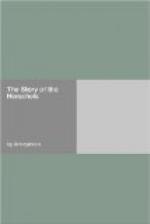A common two-foot telescope falling into his hands, revealed to him the wonders of the heavens. His imagination was inspired by their contemplation; with ever-increasing enthusiasm he gazed on the revolving planets, on the flashing stars; he determined to fathom more profoundly the constellated depths. A larger instrument was necessary, and Herschel wrote to London for it; but the price demanded proved far beyond the resources of the sanguine organist. What should he do? He was not the man to be beaten back by a difficulty: as he could not buy a telescope, he resolved to make one; an instrument eighteen or twenty feet long, which would reveal to him the phases of the remotest planets. And straightway the musician entered on a multitude of ingenious experiments, so as to discover the particular metallic alloys that reflected light with the greatest intensity, the best means of giving the parabolic figure to the mirrors, the necessary degree of polish, and other practical details. In his eager pursuit he enlisted the services of his loving and intelligent sister. “I was much hindered in my musical practice,” she writes, “by my help being continually wanted in the execution of the various contrivances; and I had to amuse myself by making the tube of pasteboard for the glasses which were to arrive from London—for at that time no optician had settled at Bath. But when all was finished, no one besides my brother could get a glimpse of Jupiter or Saturn, for the great length of the tube would not allow it to be kept in a straight line. This difficulty, however, was soon removed, by substituting tin tubes.”
The work went on famously, as might be expected from so much ardour, perseverance, and ingenuity. Of a Quaker resident at Bath, the musician-astronomer purchased a quantity of patterns, tools, hones, polishers, and unfinished mirrors. Every room in the house was converted into a workshop. In a handsomely-furnished drawing-room might be seen a cabinetmaker constructing a tube and stands of all descriptions; while Herschel’s brother Alex was engaged in a bedroom in putting up a gigantic turning-machine. Meantime, the claims of music could not be ignored: there were frequent rehearsals for the public concerts; lessons to pupils; the composition of glees and catches, and the like; the superintendence of the practice of the chapel choir; and the study of sonatas and concertos for public performance. But all the leisure that could be made or stolen was occupied in labours which proved their own reward. Straight from the concert-platform rushed the musician to his workshop, and many a lace ruffle was torn by nails or bespattered by molten pitch; to say nothing of the positive danger to which Herschel continually exposed himself by the precipitancy of his movements. For example: one Saturday evening, when the two brothers returned from a concert between eleven and twelve o’clock, William amused himself all the way home with the idea of being at liberty to spend the next day, except the few hours’ duty at chapel, at the turning-bench; but recollecting that the tools wanted sharpening, they ran with them and a lantern to their landlord’s grindstone in a public yard, where, very naturally, they did not wish to be seen on a Sunday morning. But William was soon brought back by his brother, almost swooning with the loss of one of his finger-nails.




